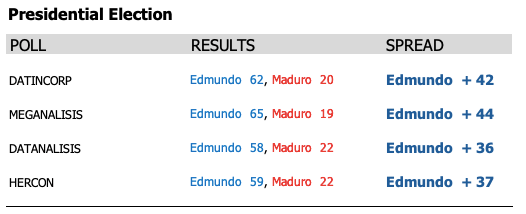





|
Tweet
|
|
|
“Appetite, with an opinion of attaining, is called hope; the same without such opinion, despair.” - Thomas Hobbes
The establishment of the “Venezuela Nuestra del Siglo XXI” Campaign Command last Thursday marks Nicolás Maduro’s strategy to overcome the substantial lead held by the democratic candidate, Edmundo González Urrutia, in the upcoming presidential elections on July 28, 2024. Maduro aims to secure his reelection through this structure, mobilization, and disinformation. Launched from the Hotel Humboldt in Caracas, the campaign command comprises seven working teams, each assigned specific roles to maximize efficiency and impact. The “Gang of Five” will lead the effort:
To reconnect with popular sectors that once supported Hugo Chavez, Maduro instructed his command to organize “thousands” of support events. He emphasizes the importance of popular mobilizations to build momentum towards the grand mobilization on July 28. These actions counteract the rise of a citizen rebellion and face the challenge posed by the diplomat González Urrutia. Through demonstrations, Maduro aims to create a perception of broad support, frighten the opposition, and discourage his electorate from voting against him. In televised speeches, he shows manipulated images to reinforce his popular support and legitimacy narrative. Regarding his image, the key strategy presents Maduro as the defender of Venezuelan sovereignty to consolidate power and legitimacy. He employs various tactics and narratives (post-truth) to achieve this goal. Resilience and Courage Against External Pressures One highlighted element is Maduro’s resilience against sanctions and pressures from countries like the United States. Far from weakening the Venezuelan government, these measures portray tests of Maduro’s courage and determination to defend national sovereignty. This discourse resonates with an anti-imperialist narrative accusing foreign powers of meddling in Venezuela’s internal affairs, a historically sensitive issue in the region and among Chávez’s bases. Leadership During the COVID-19 Pandemic Another crucial point showcases Maduro’s leadership during the COVID-19 pandemic. Despite economic and health challenges, the Bolivarian regime maintained a firm stance, implementing measures to mitigate the virus’s impact. Consequently, Maduro is presented as a leader capable of guiding Venezuela through global crises, reinforcing his image of resilience and management capacity amid external adversities. Anti-Imperialist Narrative and Media Using the anti-imperialist narrative is fundamental. This strategy includes accusing the United States and other countries of attempting to destabilize his administration while criticizing international media coverage as biased and controlled by foreign interests aiming to delegitimize Maduro’s regime. This narrative strengthens the PSUV candidate’s image as a defender of sovereignty while generating distrust towards alternative information sources outside national media. Achievements in Security and Economy Another pillar of this strategy is highlighting the regime’s achievements in public security and the economy. Attributing these successes to resistance against sanctions and external pressures seeks to build an image of success and stability. Contrasting Maduro’s experience and leadership with Edmundo González’s supposed lack of expertise, portraying him as a U.S. puppet further strengthens Maduro’s position. Territorial Integrity Defense Emphasizing Maduro’s firm stance in conflicts like the Esequibo is essential to portraying him as an unwavering defender of Venezuelan territorial integrity. Although symbolic, the promulgation of the Organic Law for the Defense of the Esequibo and sending protest notes to international organizations demonstrate his commitment to national sovereignty. Media Campaign and Community Participation Developing a robust media campaign using all available channels disseminates Maduro’s message as a defender of sovereignty, which is a fundamental strategy. Public events highlight the regime’s achievements and resistance against sanctions to broaden message reach and credibility. Thus, he rejected the European Union’s recent suspension of imposed sanctions. Furthermore, involving community leaders, social organizations, and popular movements strengthens his support base. Conclusion: The establishment of the “Venezuela Nuestra del Siglo XXI” campaign command outlines Maduro’s strategies focused on more of the same to ensure his reelection. With this organizational structure, an emphasis on popular mobilization, and a narrative of resistance against foreign intervention, Maduro believes he consolidates power and faces internal and external challenges. However, the strong voter turnout shows Venezuelans’ desire for change. Eight out of ten want the Gang of Five out of Miraflores. They seek to reunite with loved ones and reliable public services, fuel, food, and healthcare. They want an end to the nation’s looting. Venezuelans have changed, yet the Gang in Miraflores believes continuing this strategy will keep them in power. It no longer attracts attention, not even conversation. We witness a citizen rebellion and the end of Venezuela’s Fifth Republic. |

